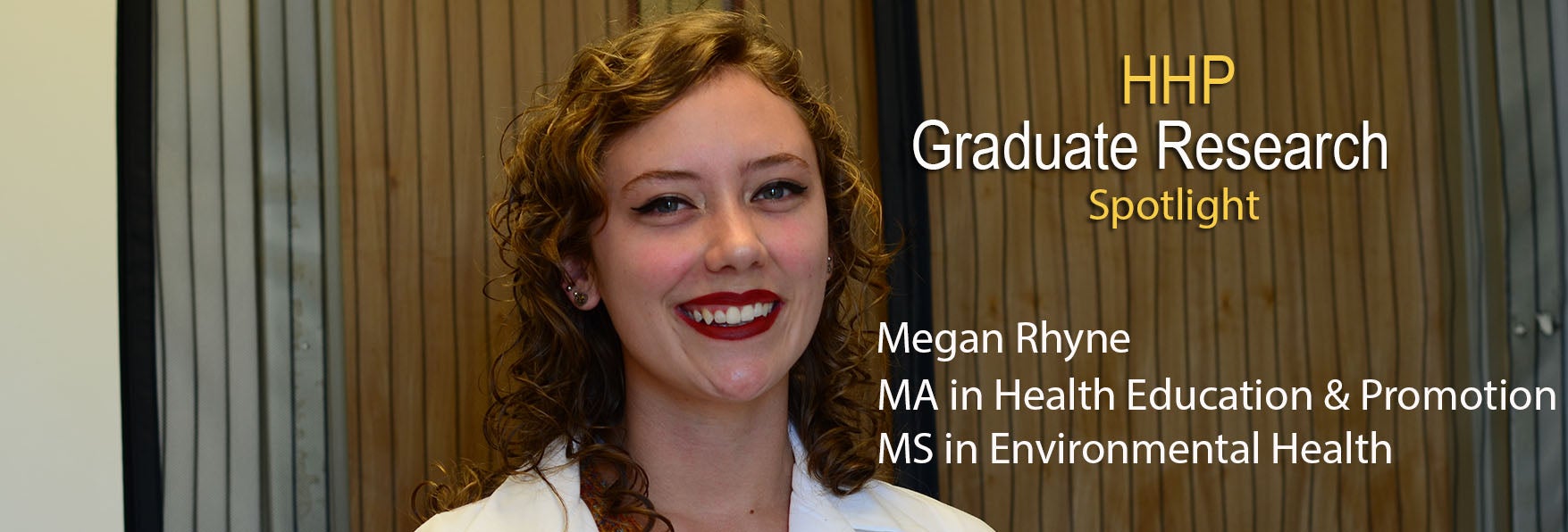HHP Graduate Research Spotlight - Megan Rhyne
Name: Megan Rhyne
Major: MA in Health Education & Promotion and MS in Environmental Health
Faculty Mentor: Dr. Stephanie Richards
Describe your current research project:
My research focuses on the impact of the Insect Growth Regulator (IGR) pyriproxyfen on Aedes albopictus mosquitoes or more commonly known as the Asian tiger mosquito. This invasive vector species is found all over the world and feeds off a wide range of hosts, it is also known to be a significant biting nuisance. Ae. Albopictus is an epidemiologically important vector because it is capable of transmitting pathogens that cause disease such as yellow fever, dengue, and chikungunya. Specifically, I’m focusing on how pyriproxyfen impacts the life table characteristics fertility (egg laying), fecundity (egg hatching), and adult emergence of the Asian Tiger Mosquito.
Why did you choose this particular topic?
I chose this topic because of the threat to public health that these vectors pose with their ability to transmit pathogens that cause disease. I focused on the IGR pyriproxyfen because we are looking for more efficient ways to manage and reduce the mosquito population before they even have a chance to emerge. Also, ever since I was a child I have always been eaten alive by mosquitoes, so I have a perpetual interest in finding effective ways to manage the mosquito population.
What outcomes or impact do you hope your research will accomplish?
I hope that through my research I will find that exposure to the IGR pyriproxyfen will reduce egg laying, egg hatching, and subsequent adult emergence among Aedes albopictus mosquitoes. I hope that in the future comparisons can be done to evaluate efficacy of pyriproxyfen on life table characteristics of other mosquitoes. Mainly, I want to find ways to effectively manage the mosquito population while causing minimal damage to the surrounding environment.
Do you feel that participating in such research will impact your job placement after graduation? If so, how?
Absolutely, I feel more well equipped to work and function in a laboratory setting based off the experiences I have engaged in here. Having the opportunity to present my research at conferences and events has also largely helped me with public speaking and learning how to relay information to a crowd in a way in which everyone can understand.
What has been your favorite part of your research?
My favorite part about my research is that it has given me the opportunity to work out in the field and within the lab, so I get to see both sides of the story and better comprehend the experience. I also have enjoyed being able to educate others about facts related to mosquitos that they may have never known before. For example, males do not bite, they are vital pollinators, it is just female mosquitoes who blood feed. Some mosquitoes are beneficial to have around because they eat other mosquitoes and help to control the population. And some mosquitoes do not bite humans and do not have the ability to transmit pathogens that cause disease, so they are not all harmful.
